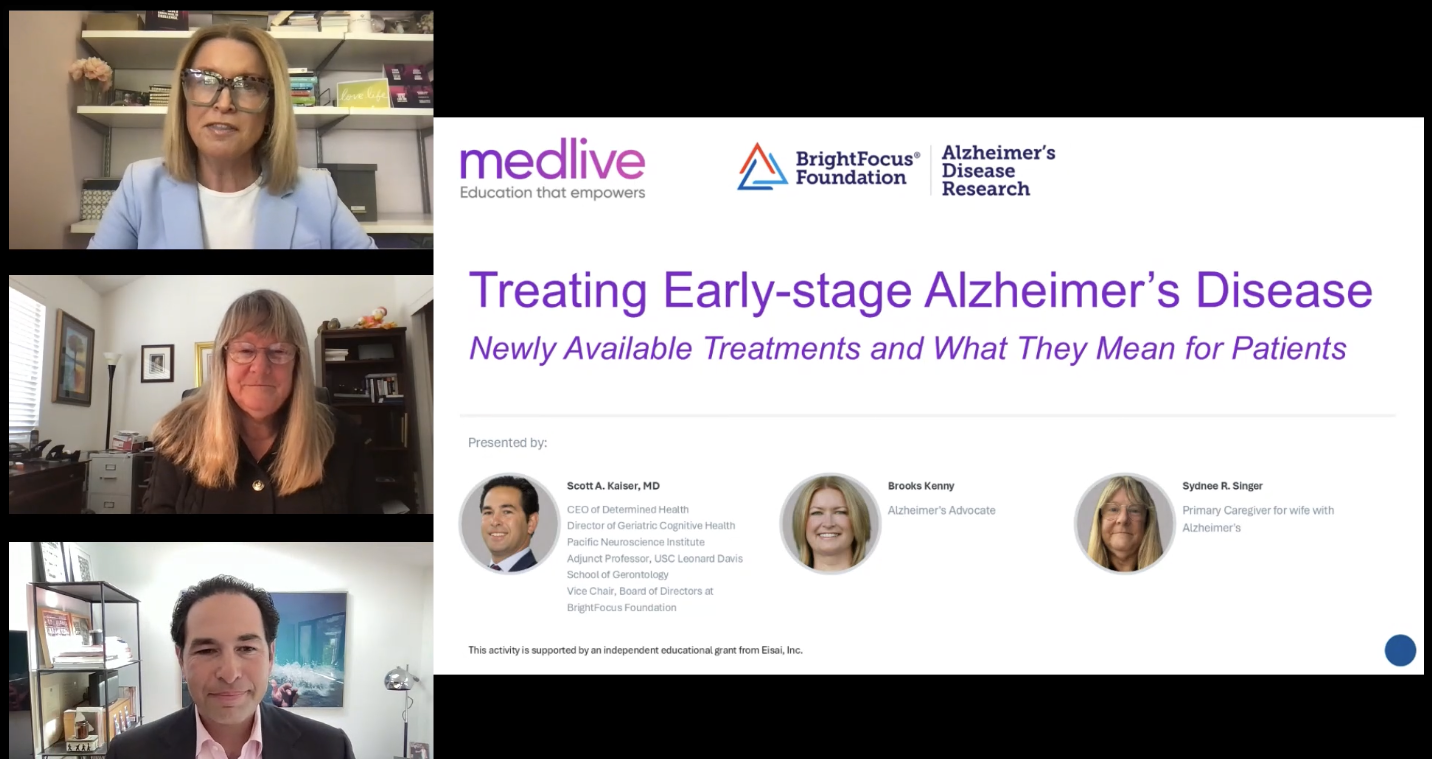
Key Takeaways
- Alzheimer’s blood tests offer a cost-effective and less invasive method for confirming a suspected Alzheimer’s diagnosis.
- However, diagnosing Alzheimer’s using only a blood test can be misleading. These are a screening tool for physicians to evaluate risk and trigger further follow-up testing.
- Blood tests are only just the beginning of an ongoing evolution in Alzheimer’s screening technology. Some scientists believe that digital health data is the next frontier for advancing early detection in Alzheimer’s globally.
- Scientists funded by BrightFocus Foundation’s Alzheimer’s Disease Research program are working diligently to improve Alzheimer’s blood tests and develop innovative Alzheimer’s screening technology using digital tools.
For many years, receiving an Alzheimer’s diagnosis meant undergoing expensive and invasive procedures. Physicians confirmed their suspected diagnosis with spinal taps and brain imaging to detect misfolded proteins associated with the disease. The difficult nature of this process created a significant barrier for the millions of people worldwide living with Alzheimer’s disease. Scientists, healthcare providers, and affected individuals eagerly awaited a blood test that could eliminate this barrier and get more people care, sooner.
That moment has arrived. Several blood tests are now available that can be accessed through a physician’s office. And not a moment too soon, as newly approved treatments require an Alzheimer’s diagnosis and the confirmed presence of Alzheimer’s pathology.
Learn more about how blood tests are evolving Alzheimer’s detection and what this means for those seeking a diagnosis.
Can a Blood Test Diagnose Alzheimer’s?
Alzheimer’s blood tests have advanced rapidly since first becoming available in 2020, and so have their accessibility. C2N Diagnostics just announced that its Alzheimer’s blood tests will now reach over 75 countries to globalize early Alzheimer’s detection. A 2024 landmark study published in JAMA showed that the company’s PrecivityAD2™ blood test exhibited a higher accuracy (90%) in detecting Alzheimer’s pathology than primary care physicians using clinical examinations, cognitive testing, and CT scans (61%). PrecivityAD2™ was also shown to be as accurate as spinal taps and amyloid PET imaging. Based on these findings, the company believes PrecivityAD2™ could improve Alzheimer’s detection in primary care settings.
Current guidelines recommend using blood tests as a screening tool for Alzheimer’s, followed by additional testing to confirm the diagnosis. However, the advent of Alzheimer’s blood tests has shifted how some scientists and physicians view a diagnosis of Alzheimer’s disease. A controversial new proposal emphasizes elevated amyloid-beta levels as the main criteria for diagnosis, placing less weight on the presence of clinical symptoms like cognitive impairment. This has given way to the idea—if these guidelines are followed—that one day, biomarkers alone will be used to diagnose Alzheimer’s in someone without any symptoms.
Yet, diagnosing Alzheimer’s by biology alone may be misleading. Biomarkers detected by blood tests are necessary for determining if the disease is present, but they aren’t sufficient, said Dr. Rhoda Au, a professor at Boston University School of Medicine who spoke at BrightFocus Foundation’s annual Common Features symposium exploring connections between eye and brain diseases.
Some people meet the diagnostic biomarker criteria for Alzheimer’s disease, but never clinically express it, she explained.
Dr. Sharyn Rossi, BrightFocus Foundation’s Director of Neuroscience Programs, also expressed caution when considering the use of biomarkers alone to diagnose the disease. “Blood tests are only part of a much-needed diagnostic package for Alzheimer’s disease. They should be used in the clinic, alongside cognitive tests and other digital or neurological assessments, to better screen for those at risk for the disease,” she explained.
The Next Frontier for Diagnosing Alzheimer’s Disease
Blood tests currently available to the public are only just the beginning of an ongoing evolution in Alzheimer’s screening technology.
Research is currently underway to improve and expand the scope of what disease biomarkers are captured in blood tests. BrightFocus Foundation Alzheimer’s Disease Research grant recipient Dr. Yuval Dor is developing a specific blood test that measures DNA released by dying cells into the blood and determines which cells it came from. Doing so helps scientists identify and monitor brain cell death in people developing Alzheimer’s.
Scientists funded by Alzheimer’s Disease Research are also harnessing blood samples to mark the progression of Alzheimer’s in stages. Dr. Gemma Salvadó and mentor Dr. Oskar Hansson are developing an Alzheimer’s staging model to characterize people across different disease stages using blood-based biomarkers. The staging model may eventually help decide, in an easy and cost-effective way, who would benefit from an Alzheimer’s treatment and empower more personalized care.
Harnessing the Digital Age for Better Alzheimer’s Detection
Boston University’s Dr. Au believes digital health data is the new blood. Currently, blood tests are leading the change in Alzheimer’s detection because “we’re comfortable with the idea that we can collect blood, and we can do it almost anywhere in the world… and then we can store blood,” she said.
She added, “I want us to think about digital in the same way we think about blood. The idea that you can collect digital, you can store digital, and you can analyze digital.”
Viewing digital information as a source for Alzheimer’s screening opens a large world of possibility. These can include digital tests, data from smartphones, and many more alternative options to measure cognitive function, according to Dr. Au.
Turning attention to digital as the next frontier could catalyze the creation of globally scalable Alzheimer’s disease screening tools, create internationally appropriate cognitive tests, and foster a more inclusive framework for global precision health, she said. “The realm of digital is really the wild frontier.”
Alzheimer’s Disease Research-Funded Scientists Put Digital Theory to Practice
Scientists are already harnessing data from daily life to improve Alzheimer’s detection. Alzheimer’s Disease Research grant recipient Dr. Ganesh Babulal uses GPS-monitoring of driving behaviors to better detect changes in cognition. His work supports that increases in driving errors may serve as an early digital biomarker for Alzheimer’s detection.
Digital tools like artificial intelligence are also being tested in research settings to improve clinical trial recruitment and advance Alzheimer’s diagnostics. Dr. Aristeidis Sotiras, an Alzheimer’s Disease Research-funded scientist, is using state-of-the-art deep learning methods to identify individuals at the earliest disease stage. His efforts will help scientists improve the recruitment of eligible participants for clinical trials.
Further, an international research team funded by Alzheimer’s Disease Research successfully developed a first-of-its-kind artificial intelligence (AI) model that could eventually detect Alzheimer’s disease through photographs of the retina.
The model recognizes complex patterns in photographs and other data to produce faster, more accurate results. This confers a distinct advantage for the affected person, allowing for earlier diagnosis and intervention— a key factor to slowing disease progression.
The researchers said it’s their hope that soon, routine eye exams to look for diseases like glaucoma could also include screenings for Alzheimer’s disease.
Other Alzheimer’s Disease Research grant recipients are also leveraging digital tools to push the boundaries of Alzheimer’s detection. Dr. Tatsuhiko Naito and mentor Dr. Towfique Raj are working to unravel the genetic complexities of Alzheimer’s disease with machine-learning technologies. Their research will create a model to predict the impact of genetic mutations in brain cells. They will then apply this model to a huge genomic dataset to determine potential effects on individuals with Alzheimer’s. A better understanding of genetic associations of Alzheimer’s will aid in developing new treatments and identifying biomarkers.
Summary
Alzheimer’s blood tests hold the promise of better disease screening and early detection—but they are one tool among an entire toolkit that physicians can use to eventually diagnose and distinguish various types of Alzheimer’s and related dementias. There is justified excitement for a screening tool that is less costly and invasive, but still accurate. However, it is important to remember that Alzheimer’s is an incredibly complex disease. Diagnosing it remains a great challenge that requires multiple approaches to get it right.
The digital age may bring a more expansive approach to Alzheimer’s screening—filling in the knowledge gaps left behind by using blood tests alone.
“Multiple biological factors are implicated in Alzheimer’s disease and related dementias. Given this, it’s clear that existing diagnostic tests are insufficient for early detection or distinguishing between types,” said BrightFocus Foundation’s Dr. Rossi. “A comprehensive approach is needed—one that combines a battery of tests including digital assessments, cognitive evaluations, and extensive blood panels. This approach provides a more holistic and accurate diagnosis that can guide effective treatment strategies.”
About BrightFocus Foundation
BrightFocus Foundation is a premier global nonprofit funder of research to defeat Alzheimer’s, macular degeneration, and glaucoma. Through its flagship research programs — Alzheimer’s Disease Research, Macular Degeneration Research, and National Glaucoma Research— the Foundation has awarded nearly $300 million in groundbreaking research funding over the past 51 years and shares the latest research findings, expert information, and resources to empower the millions impacted by these devastating diseases. Learn more at brightfocus.org.
Disclaimer: The information provided here is a public service of BrightFocus Foundation and is not intended to constitute medical advice. Please consult your physician for personalized medical, dietary, and/or exercise advice. Any medications or supplements should only be taken under medical supervision. BrightFocus Foundation does not endorse any medical products or therapies.
- Brain Health
- Genetics
Featured Grant Recipients

Yuval Dor, PhD
Hebrew University of Jerusalem

Gemma Salvadó, PhD
Lund University










